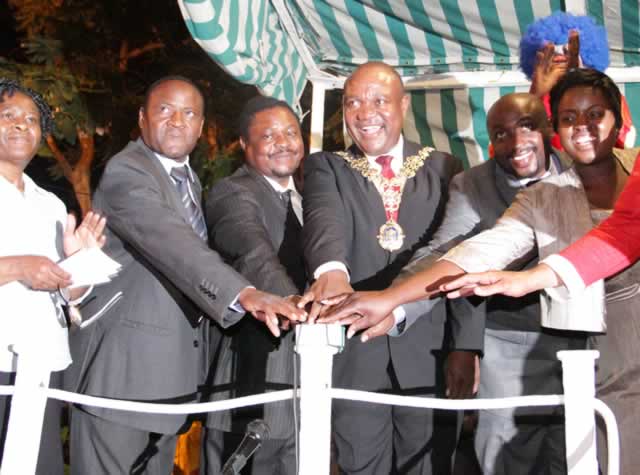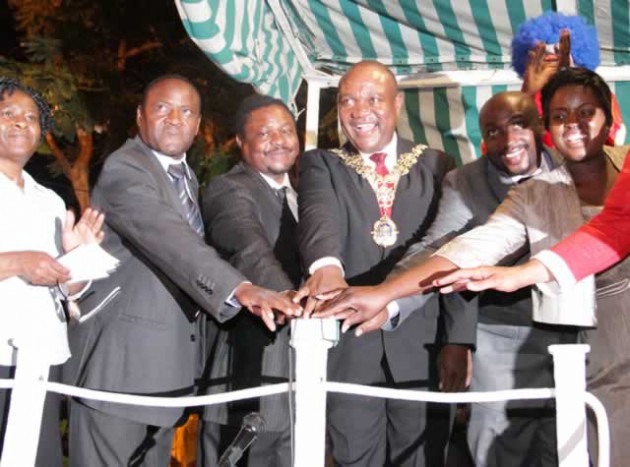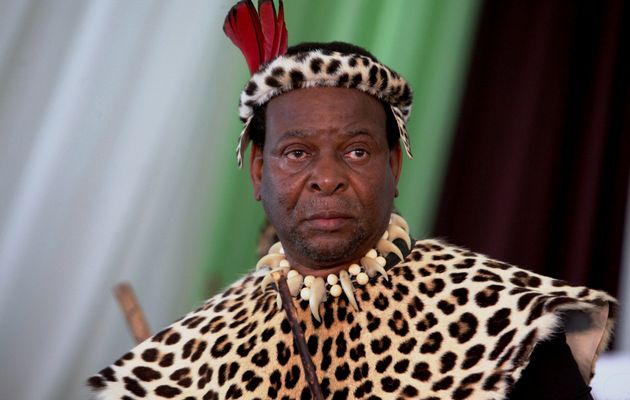OLD TIMERS REFLECT ON INDEPENDENCE


Harare Mayor Bernard Manyenyeni (centre) at a ceremony to switch on Christmas lights in December 2014. Before Independence blacks were not allowed in Africa Unity Square
Monica Cheru-Mpambawashe and Fanuel Kangondo
“Achimbangu, achimbangu!” preschool kids today sing artlessly without a clue of what a chimbangu might be nor an inkling of the second half which crudely defines the word. But those who lived in the African townships so many decades ago and started that ditty have no pleasant memories of that experience.
“We had no sewer systems in the old locations like Harare (now Mbare) and we used the bucket system. The men who had that unpleasant duty to collect the bucket were known as ‘achimbangu’. I think the word may have had Malawian origins as we had many immigrants from that country in the locations,” recalls Jordan Munhema (78).
Mr Munhema has since moved to Highlands but his family has retained the Mbare home in Chatima Street which has since been modernised.
“If you had told us in the sixties or even mid-seventies that a black person would live in the low density areas without being a domestic worker we would have laughed at you. Although there was a liberation struggle and we generally knew what the end game was, it was a dream.”
The change that Independence has wrought in the lives of Zimbabweans has been undeniably great. Such change may not be discernible to those born after 1980 who have naturally come to take many liberties for granted. That they can do that is what countless men and women gave up their lives for. That is why Independence Day should be commemorated by every Zimbabwean.
Other old timers remember the restrictions on movement and association. Blacks were restricted to designated African areas and needed passes of one sort or another to venture into whites only areas. All hotels were off limits to blacks until the establishment of their own places within their segregated areas. Only those blacks with approved business such as providing menial labour in those areas could dare go there.
Blacks did not have any rights enshrined in the constitution and could be searched at any point. The doors of their urban residences would be knocked upon at all hours of the night as the security forces worked to flush what they termed illegal occupants. These included unauthorised visiting relatives.
Many remember having to disembark from a long distance bus and stand next to all their luggage while the security forces searched them. There are many horrific tales of what would happen to people found with anything considered undesirable. A popular tale says while waiting to be searched a woman somehow got a scorpion on her luggage and she was made to swallow it alive.
In sport only a few blacks managed to make it into disciplines other than football, netball and athletics. Rugby, cricket, swimming, tennis and golf were preserves of the whites. Where the blacks somehow managed to sneak in, there was no hope of going anywhere with the dream. After the Unilateral Declaration of Independence by Ian Smith from Britain in 1965 the country was placed under international sanctions and therefore there was no chance for any national team representation, even if the blacks would have been given the honour in the first place.
Old time football players like Achford Chimutanda, Freddy Gotora and many others never got a chance to prove their mettle on the international arena. Who knows what our sporting history and present would read like if the country had been free all those years back?
Former Harare Mayor Muchadeyi Masunda says that growing up in Bulawayo he and fellow black youths encountered odds simply because of their skin colour. But they made efforts to achieve what their privileged counterparts did in most sports except rugby and squash as members of a “boys club”. He says these racial demarcations affected everything a black person did including where they lived.
Mission and government boarding schools for blacks like Goromonzi were the best that the majority could hope for. To afford these schools for their children most parents had to really make sacrifices. They would practically give up on getting a shirt to cover their backs to pay school fees. Many sold off their cattle herds to get their children educated.
A few really priviledged blacks could get into private schools like Peterhouse. Former Group A government schools did not allow black students on their premises, even as visitors.
A former Peterhouse student remembers having to play the Prince Edward School rugby team at St George’s College because the black members of the Peterhouse team could not enter Prince Edward premises.
Mrs Sue Peters, a successful entrepreneur, in her upcoming biography recalls how the segregation even boxed the ambitions of the blacks.
She says all black girls dreamt of was to be a nurse or a teacher. Only a few blacks managed to rise above the glass ceiling to become lawyers and other professionals.
She recalls how even going abroad to the United Kingdom was a torturous journey with many having to go through neighbouring countries then pray that they would eventually get permission to go to those countries.
Human resources consultant Mr George Mvududu (55) reflected on the journey he has taken over the years working in Government, the private sector and ultimately forming his own business that as they grew up prospects of broad career prospects were limited as their exposure was limited.
“On completing secondary school our careers were limited to teaching, nursing, the police or the army. There was no career guidance and for some Form Two was the highest level they ever aimed for to become clerks, work in banks and maybe become artisans. Even for some of us who eventually managed to go to university, it was not smooth sailing as our generation was always about struggle and as we started to work it was not easy.”
There was an institutionalised bottle neck system in the black education sector to ensure that only those needed to keep the colonial system running smoothly would get more than the most basic education which was not compulsory.
Just like the plantation owner in the Americas invested in keeping the slave population healthy, the colonial government also made sure that its cheap or free workforce was in a state to provide service.
Immunisation and the teaching of hygiene was stressed especially in farms and towns. Conversely little was done to directly improve the welfare of people in the rural areas and it was left to the newly independent black Government to build clinics and hospitals and sink boreholes in these areas after 1980.
The list goes on and on. But the old timers say that there are lessons that we can take from the colonial period as history should teach us a few things.
“You look at Harare for instance; the number of residents has grown exponentially over the years but the existing infrastructure cannot meet the needs of the people right now. Development and expansion of the infrastructure should be in sync with the population growth and community leaders should spearhead that,” Mr Muchadeyi Masunda said.
Now a chairman of several companies, Mr Masunda said he was disheartened by the problems being experienced in the supply of adequate water and electricity as well as the bad state of roads in the City of Harare and other cities around the country. He said that Harare as the second largest enterprise after the Government has the potential of addressing the challenges it is facing right now if run efficiently.
Another business executive at the helm of a multinational in Harare who asked not to be named said he was grateful to the Government for the peace and stability that Independence brought to this country. He said that while the environment had vastly improved to favour the majority, there were a number of economic challenges that needed to be addressed to facilitate industrial expansion and create jobs for young people to enhance their livelihoods.
“There are so many young and promising graduates that are being churned out of our universities but they end up with nothing to do upon graduation because the industrial base is narrow and the environment is not conducive for other gainful economic activities.”
He added that the Government was now faced with a huge task to ensure that those born after Independence are given the opportunity to enjoy the fruits of the struggle and focus on consolidating the gains it brought.
Mr Mvududu concurred saying, “We now have a country of learned people but we are not very productive as our full potential is not being fully utilised in many respects.”
He said the prevailing economic environment had now driven many young people to obsession with personal ambitions at the expense of national priorities for the good of the country.
“We have to be brutally frank with each other here. Freedom, peace and stability yes, but what are we doing with that? There is moral decadence among us and we need to change our attitudes towards the way we now look at life.”










Comments